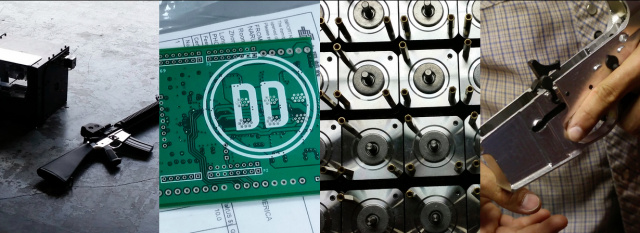Law & Disorder / Civilization & Discontents
FedEx won’t ship the box that makes homemade metal semi-automatic rifles
"I'll have to smuggle the damn thing out of my own city," Cody Wilson tells Ars.

FedEx did not immediately respond to Ars’ request for comment, but spokesman Scott Fiedler told Wired on Tuesday:
This device is capable of manufacturing firearms, and potentially by private individuals. We are uncertain at this time whether this device is a regulated commodity by local, state or federal governments. As such, to ensure we comply with the applicable law and regulations, FedEx declined to ship this device until we know more about how it will be regulated.The United States Postal Service, UPS, and DHL did not immediately respond to Ars' request for comment.
However, unfinished lower receivers for AR-15 semi-automatic rifles are routinely shipped nationwide, as are CNC mills.
The AR-15, the civilian version of the M-16 military assault rifle, is designed to be modular, meaning it can be assembled from different receivers, barrels, buttstocks, and other components, each with its own characteristics.
Under American federal law, the lower receiver part of a firearm is the crucial part that contains all of the gun's operating parts, including the trigger group and the magazine port. (In short, the lower is what's defined as the firearm itself.) The Ghost Gunner is designed to take an unfinished receiver (sometimes dubbed an “80 percent” lower) and finish the job.
As a result, Wilson added, FedEx will almost certainly lose his business.
“The thing is I bet UPS will blackball me as well and I'll have to smuggle the damn thing out of my own city,” he wrote, adding that to date he has sold “around 1,200” of the devices, and that he “can’t keep up with demand.”
Even at the introductory price of $1,200 (which has since been raised to $1,500), that would mean that Defense Distributed has taken in over $800,000 in revenue in just a few months. (Not all of the sold mills have been fully paid beyond an initial deposit.) The site reports the Ghost Gunner is backordered until Q2 2015.
“I will find another way”
As Ars reported previously, the Ghost Gunner, which first debuted in October 2014, can complete an unfinished lower receiver for an AR-15 semi-automatic rifle in around an hour. While designed to mill an AR-15 lower, the CNC could theoretically mill anything of a similar size. Now, the total cost of a semi-finished lower, a parts kit, an upper, a magazine, and the Ghost Gunner ($1,500) is around $2,300—not a significant savings over buying the whole thing lock, stock, and barrel. However, many hobbyists are excited at the opportunity, particularly given the fact that it makes such weapons effectively anonymous and untraceable.The Ghost Gunner makes home gunsmithing faster, cheaper, and more portable than ever before.
In the Tuesday e-mail to supporters, Wilson elaborated:
Now FedEx has told me that they will NOT ship my product at all, and though they will not give me a reason in writing, they have told Wired.com that it is because my machine allows an individual to make a gun.
I will find another way to ship the machine. I emailed today because I feel you should know that FedEx is uncomfortable with the constitutionally protected right to make a rifle free from government surveillance. They may cater to the firearms industry, but they have a specific antipathy to the non-commercial acquisition of firearms.
When is a gun not a gun?
With a semi-finished lower, a parts kit, an upper, and a magazine, Wilson previously told Ars that anyone can hook up the mill to their computer and have a gun ready to fire in a short period of time. "Our gold standard is: you’re going to finish it in an hour," he said.The United States Gun Control Act (GCA) of 1968 allows anyone to manufacture their own firearm without a license, but manufacturing such weaponry for sale or transfer does require a federal license.
As a way to get around that law, manufacturers can make a product that isn’t technically a gun, but gets as close to the line as possible. The Ghost Gunner CNC mill requires that the buyer provide their own semi-finished lower, which is sometimes dubbed an "80 percent lower."
"The term 80 percent receiver comes from the seller, that’s not a term that we use," a spokesman from the Bureau of Alcohol, Tobacco, and Firearms (ATF) told Ars last year.
"That’s a term from the seller or creator of the device that it’s 80 percent of a finished receiver, therefore it is legal. That’s not a determination we make."
In short, in the ATF’s view, either something is a firearm or it isn’t—and if it isn’t, it can be sold without restriction.
But in January 2015, the agency released ATF Rule 2015-1 and clarified that a gunsmith or machine shop cannot use its tool to refine an 80 percent to make it a suitable firearm, but the ruling does not affect CNCs owned by individuals.
"Nothing in this ruling affects the ability of individuals to make their own firearms for personal use, as allowed by law," Ginger Colbrun, an ATF spokeswoman, told Ars by e-mail on Tuesday
http://arstechnica.com/tech-policy/2015/02/fedex-wont-ship-the-box-that-makes-homemade-metal-semi-automatic-rifles/
No comments:
Post a Comment